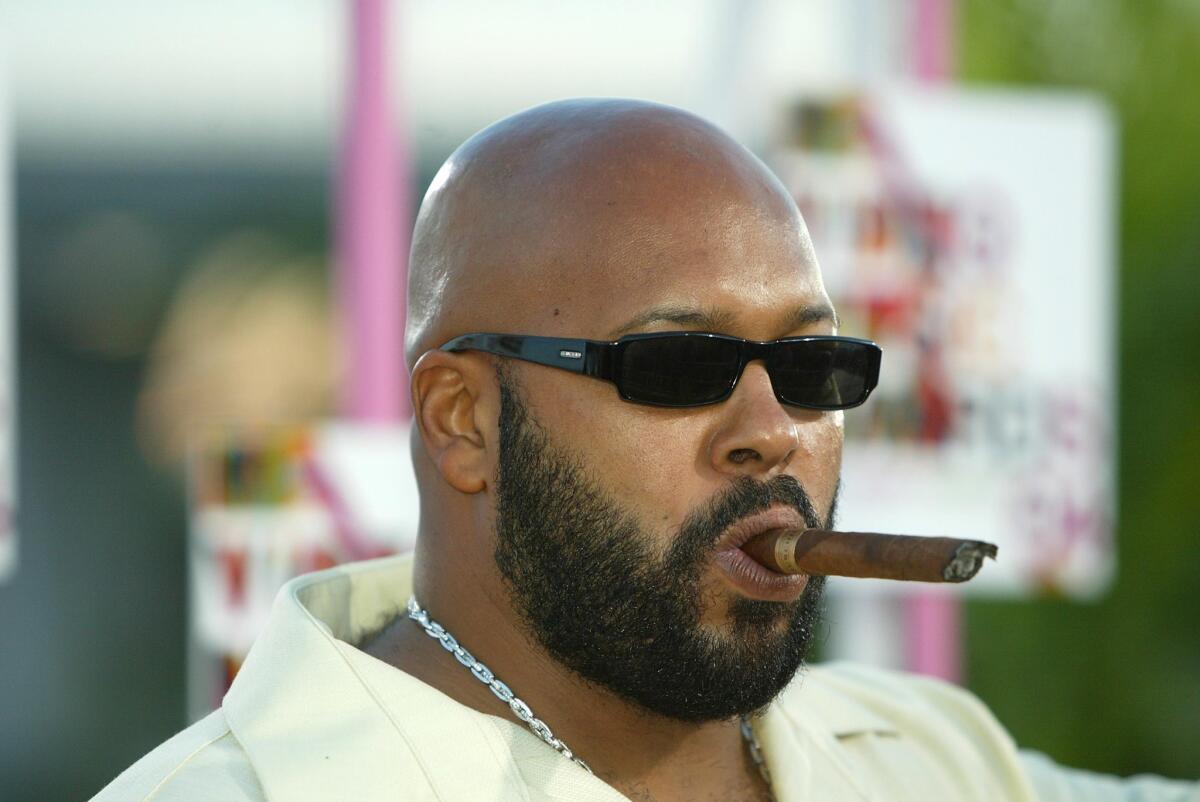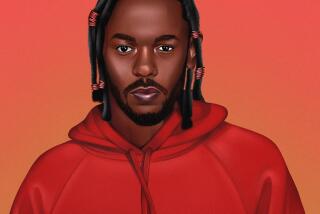Suge Knight remains stuck in a gangsta rap past

In the 2-1/2 decades since Marion “Suge” Knight founded his volatile label Death Row Records, the label’s artists and crew have moved beyond gangsta rap and onto more peaceful projects.
Andre “Dr. Dre” Young co-founded Beats Electronics, the headphone company and streaming service recently sold to Apple for $3 billion, and endowed an arts academy at USC.
Ice Cube carved out a thriving film career, producing and starring in comedies such as “Friday,” the “Barbershop” series, “Ride Along” and family friendly fare like “Are We There Yet?”
FROM THE ARCHIVES: Suge Knight’s empire has dwindled, but he sees only possibilities
Even Snoop Dogg, who was once acquitted of murder charges, has built an empire out of endorsement deals. His numerous branded products have ventured outside of the realm of hip-hop, and Snoop’s projects have explored chilled-out, spiritual Rastafari and feel-good funk.
For Knight, however, the violent thug life that Death Row once soundtracked has continued to be close at hand, even as his musical impact has lessened. While the L.A. hip-hop world has largely left the overt, glamorized violence of the ‘90s far behind, the one-time hip-hop mogul appears drawn to it.
As Knight’s peers are pursuing numerous entertainment and business ventures, he’s continued to amass a storied list of legal and personal troubles that have tarnished the Death Row legacy.
“You’re talking about many, many years of how [he] dealt with things,” said author Nina Bhadreshwar, who worked for Death Row Records from 1994 to 1996 and was editor of Death Row Uncut magazine. “It’s where he’s from. It’s his history. He’s not someone who makes himself vulnerable of people. He’s gotta be the protector and provider of people, when actually he needed some mentoring ... but nobody did because everybody fears him.”
Knight’s ambitions for Death Row was to make rap culture as prominent as rock music, a goal he helped accomplish. Yet today Knight is remembered more for his rap sheet than his contributions to the genre.
“It makes no sense,” Bhadreshwar added. “He has chosen that route. He has lost a lot of friends. He lost his business. A lot of stuff has happened to him. It’s a tragedy, but it’s always down to the people around you.”
Thursday’s alleged hit-and-run, which left an associate of Knight’s dead and the former tycoon arrested on suspicion of murder, is just the latest chapter in Knight’s saga of misfortune and violence that has followed him for decades and more recently veered closer toward disaster. The incident occurred near the filming of a commercial for “Straight Outta Compton,” a biopic about N.W.A., a seminal group from the early days of the genre.
RELATED: ‘Suge’ Knight, no stranger to legal trouble, faces most serious charges
In August, Knight was shot at the West Hollywood nightclub 1OAK while attending an MTV Video Music Awards pre-party hosted by R&B singer Chris Brown. In October, he was arrested alongside the comedian Katt Williams in Las Vegas for allegedly stealing a woman’s camera. It’s incidents like those that have added to Knight’s notoriety. But there are many more controversies in Knight’s past.
During the notorious 1996 Las Vegas drive-by shooting that killed Death Row star Tupac Shakur, Knight drove the car. The death of Shakur remains unsolved.
The following year, he was sentenced to prison for violating probation terms stemming from a previous assault case, and following his 2001 release he went back to prison in 2003 for hitting a parking attendant. Knight filed for bankruptcy and sold his Malibu home in 2006, and was again arrested in Las Vegas for assault and drug possession in 2008.
Yet despite this, even those who knew him best seem confused and saddened by this latest turn. Michel’le Toussant, an R&B singer who was Knight’s ex lover and mother of his child, said: “My heart goes out to the family of Terry Carter and to those injured. I don’t have any information on what actually happened between Suge and Dre, and its too early for me to speculate.”
His early contributions to hip-hop can’t be denied, but they aren’t celebrated either. Acts that came up under him like DJ Quik or Snoop Dogg or Ice Cube rarely, if ever, speak of him publicly – nor does Dr. Dre.
And while his travails have stacked up, a new kind of Compton hip-hop artist has emerged, one indebted to the accomplishments of Death Row but almost entirely divorced from its image (and real-life history) of violence. For today’s generation of L.A. hip-hop, who grew up after the ravages of violence depicted in ‘90s gangsta rap, the kind of tumultuous lifestyle embodied by Knight was something to flee.
Kendrick Lamar became a best-selling artist on the strength of his LP “good kid, m.A.A.d. city,” which documented his rough childhood from the perspective of a deeply observant outsider with a loving family and even once told The Times, “You hear stories from the ‘80s about people selling dope and becoming millionaires, but in reality it’d just be guys walking around with $70 in their pockets. I knew I wanted something else.”
Aspirations of pushing a different kind of West Coast rap is the driving force of Lamar’s label Top Dawg Entertainment, founded by Anthony Tiffith in nearby Carson, which has actively rebutted the Death Row-era stereotypes of a South L.A. hip-hop collective.
In an April interview, before a performance on Jimmy Kimmel’s late night show, South L.A. rapper Schoolboy Q said that for him and his peers music was a way out of that nihilistic lifestyle, not a means of glorifying it.
“TDE was an escape for me,” he said. “I was on my last legs with drugs and banging and I hit rock bottom. But [the label’s founders] were street dudes who got away, and seeing that that changed my whole life around. It took time, but I became the dude who could smile and tell jokes again.”
Compton itself has dramatically changed its image too.
The city, once known for its violent gang-ridden streets, hosts a gospel music festival to specifically counter the gangsta rap images that are still associated with the city. Compton’s charismatic mayor, 32-year-old Aja Brown, has worked to bring amenities like a farmer’s market and healthy new investments to the city.
Unlike director John Singleton’s 1991 feature “Boyz n the Hood,” a real-time howl of despair from South L.A. gang culture, the “Straight Outta Compton” biopic was a document of a bygone era, one that deeply informed L.A. music culture but is largely a piece of history.
Still, Bhadreshwar said there’s a side of Knight – beyond the crime and violence – that could have taken him down a different path.
“People forget how young he was and how he achieved everything. He took risks, and he never backed down from consequences,” she added. “It’s just a shame that he carried on making them and playing into the role that people have made for him. He’s playing the role in a script that people have written for him when he’s the one who wrote it first.”
Twitter: @AugustBrown; @GerrickKennedy
More to Read
The biggest entertainment stories
Get our big stories about Hollywood, film, television, music, arts, culture and more right in your inbox as soon as they publish.
You may occasionally receive promotional content from the Los Angeles Times.












